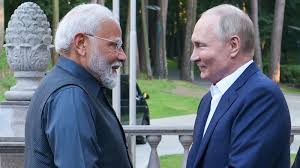
Modi–Putin Meet Today Amid Tensions Over Trump’s Oil Tariffs

 :
| Updated On: 01-Sep-2025 @ 11:33 am
:
| Updated On: 01-Sep-2025 @ 11:33 amSHARE
Prime Minister Narendra Modi is scheduled to meet Russian President Vladimir Putin on Monday during the Shanghai Cooperation Organisation (SCO) summit in Tianjin. This will be their first in-person meeting since the United States penalized India for continuing to buy Russian oil by imposing an additional 25% tariff on Indian goods, on top of the existing reciprocal tariff of 25%. The decision by Washington has created fresh strains in India-US relations and added urgency to Modi’s discussions with Putin.
Putin, who met US President Donald Trump in Alaska earlier this month, has already spoken twice with Modi in August—once before and once after his meeting with Trump. During these calls, Putin shared his insights and assessment of the Alaska talks with Modi. Shortly after, Ukrainian President Volodymyr Zelenskyy also spoke to Modi, underlining the importance of India’s role in efforts to end the war in Ukraine. Zelenskyy emphasized that a ceasefire was the necessary first step toward peace and that India could play a vital role in signaling Russia and other leaders toward negotiations.
The upcoming Modi-Putin meeting is scheduled for around 45 minutes and carries significant weight. Washington has been openly critical of India’s continued purchase of Russian oil despite global sanctions. India, however, maintains that other countries, including China and several European nations, have also been buying discounted Russian oil, and therefore it is unfair for New Delhi to be singled out. Foreign Secretary Vikram Misri avoided commenting in detail on the expected discussions, emphasizing that the leaders should be allowed to hold their talks before any predictions are made.
The geopolitical backdrop of this meeting is complex. On August 15, Putin’s Alaska summit with Trump was followed by Trump’s meeting with Zelenskyy and European leaders in Washington. Days later, on August 18, Putin phoned Modi to provide his perspective. Earlier, on August 9, Modi and Putin had already discussed Ukraine and reaffirmed their commitment to strengthening the India-Russia “Special and Privileged Strategic Partnership.” Russia has criticized Trump’s tariff escalation and publicly backed India’s right to independently choose its energy and trading partners.
Meanwhile, tensions with Washington are intensifying. Peter Navarro, Trump’s trade advisor, recently went so far as to call the Russia-Ukraine war “Modi’s war,” suggesting that India holds a key to ending the conflict. Navarro argued that “the road to peace runs through New Delhi,” while also blaming India’s choices for economic losses in America. Despite such remarks, India has stood firm on its policy of strategic autonomy. Indian ambassador to Russia, Vinay Kumar, reiterated to TASS that Indian companies will continue sourcing oil from wherever they secure the best deal, regardless of outside pressure.
Looking ahead, Putin is expected to visit India again in December, further underscoring the close and continuing engagement between New Delhi and Moscow. Last year, Modi had traveled to both Moscow and Kyiv, where he declared that solutions to conflicts cannot be found on the battlefield and that India was prepared to support peace initiatives.
Thus, the Modi-Putin meeting comes at a critical juncture. With US tariffs punishing India for Russian oil imports, Washington’s hardline stance has put New Delhi under immense pressure. Modi’s talks with Putin will therefore focus on finding a way to balance India’s deep strategic partnership with Russia while managing strained ties with the United States. This will be Modi’s third substantive engagement with Putin in just a month, signaling the urgency and importance of India-Russia coordination in the current geopolitical environment.